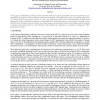Free Online Productivity Tools
i2Speak
i2Symbol
i2OCR
iTex2Img
iWeb2Print
iWeb2Shot
i2Type
iPdf2Split
iPdf2Merge
i2Bopomofo
i2Arabic
i2Style
i2Image
i2PDF
iLatex2Rtf
Sci2ools
110
click to vote
NCA
2005
IEEE
2005
IEEE
Fundamental Network Processor Performance Bounds
In this paper, fundamental conditions which bound the network processing unit (NPU) worst-case performance are established. In particular, these conditions formalize and integrate, with mathematical rigor, two existing approaches for finding the NPU performance bounds, i.e., the work conserving condition and instruction/latency budget based approaches. These fundamental conditions are then employed to derive tight memory access latency bounds for a data path flow with one memory access. Finally, one of these memory access latency bounds is successfully used to interpret a peculiar phenomenon found in Intel IXP1200, demonstrating the importance of analytical modeling for NPU performance analysis.
Access Latency Bounds | Fundamental Conditions | Memory Access Latency | NCA 2005 | Network Computing |
Related Content
| Added | 25 Jun 2010 |
| Updated | 25 Jun 2010 |
| Type | Conference |
| Year | 2005 |
| Where | NCA |
| Authors | Hao Che, Chethan Kumar, Basavaraj Menasinahal |
Comments (0)

